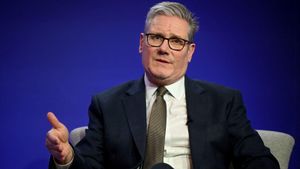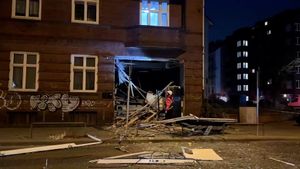The United Arab Emirates (UAE) is making significant strides across multiple sectors with ambitious national developments aimed at bolstering infrastructure, enhancing economic connectivity, and fostering international collaboration. Recently, the UAE Cabinet, chaired by His Highness Sheikh Mohammed bin Rashid Al Maktoum, has spotlighted major initiatives including the groundbreaking high-speed rail connecting Abu Dhabi and Dubai, and the establishment of the UAE Logistics Integration Council.
The development of the new high-speed rail line, set to enable travel between the capital, Abu Dhabi, and the city of Dubai in just 30 minutes at speeds of 350 kilometers per hour, marks one of the most exciting infrastructural advancements for the UAE. Releasing tender documents for the project, which is expected to operationalize by 2030, signifies the UAE's commitment to enhancing mobility and promoting economic growth. This rail line is projected to contribute approximately AED 145 billion (around £32 billion) to the national GDP over the next fifty years, positioning it as not just transportation infrastructure but as part of the UAE's overarching economic strategy.
During the cabinet meeting, Sheikh Mohammed noted, "This railway is set to transform mobility and economic connectivity across the emirates," highlighting the transformative potential of the project. Plans for the railway include not just speed but extensive coverage with five stations, including underground facilities at sensitive and high-traffic locations such as Al-Zahiyah and Al-Jaddaf.
Another notable initiative is the approval of the UAE Logistics Integration Council, which is tasked with streamlining logistics across all relevant sectors, including ports, customs, and transport. This initiative reflects the government's recognition of the logistics sector as pivotal to the economy—valued at AED 129 billion—as it aims to surpass AED 200 billion within the next seven years. Sheikh Mohammed stated, “Our goal is to expand it beyond AED 200 billion over the next seven years,” emphasizing the need for strategic cooperation to address logistical challenges effectively.
Addressing the growing threats of cybersecurity, the cabinet also approved the National Cybersecurity Strategy, which seeks to create one of the most sophisticated protective frameworks worldwide. The UAE continues to rank among the top global performers on the 2024 Global Cybersecurity Index, as Sheikh Mohammed noted: "The UAE is ranked among the top global performers...in the Global Cybersecurity Index," indicating the country’s advanced digital infrastructure.
Innovation has also taken center stage with the launch of the UAE Government Innovation Month, aimed at encouraging inventive practices across all government sectors. This event showcases the UAE’s commitment to not only improving efficiencies within the government but also fostering creativity and excellence on the global stage. Sheikh Mohammed affirmed, "Innovation will remain at the heart of enhancing government efficiency," attesting to the core philosophy of governance within the country.
Looking outward, the UAE has intensified its commitment to international partnerships by ratifying various agreements with countries such as Qatar, Kuwait, Australia, and Jordan, focusing on trade and mutual administrative assistance. Such collaborations are part of the broader effort to solidify the UAE’s standing as a global trade hub.
The UAE also reviewed the objectives of the National Youth Agenda 2031, which aims to bolster opportunities for young leaders and innovators, emphasizing the nation’s future vision of inclusivity and development. Key to this initiative is attracting global talent across sectors such as technology, healthcare, and advanced industries—positions the UAE uniquely as the world’s preferred destination for career advancement according to LinkedFor their continuous efforts, the doi.org report states.
With projects like the high-speed rail and developments within both the logistics and cybersecurity landscapes, the UAE is not just aiming to upgrade its existing infrastructure but is instead seizing the opportunity to set benchmarks globally within these sectors. Moving forward, the combination of infrastructural innovation, economic strategy, and commitment to both national and international development positions the UAE on the precipice of major economic and social transformation.
Indeed, as the cabinet continues to endorse valuable initiatives like the Dubai Metro Blue Line and the continued development of other transport systems, the future for the UAE appears not only promising but as one filled with potential for broader regional transformation and connectivity.



